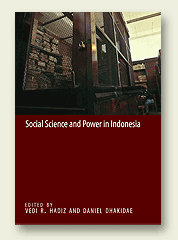I need to revise my opinion on the role the Indonesian middle class can play in solving Indonesia's problems. Earlier I said that the only hope for betterment would come from them. When thinking of it I was more hoping against hopes. Well, the situation with Indonesia has been bleaker than I thought.
Most middle-class families and businesspeople simply don't know what to do. Most of them tend to favor the status quo. To be terribly blunt, the situation that-has-been has helped them accumulate, maintain and enjoy the status. Rather than saying let's fix it while there is time, the adage is if it ain't broken, why fix it? I know; moments sometimes repeat themselves when I see myself in Them. When these moments flicker, I feel ashamed, gloomy and sorry.
 In their new book Social Sciences and Power in Indonesia published by Equinox in January 2006, Vedi R. Hadiz and Daniel Dhakidae have well succeeded in portraying how in the last 50 years social sciences in Indonesia have passed out, its scientists hijacked by the power-that-be as well as, more menacingly, by external power that comes along with borderless businesses.
In their new book Social Sciences and Power in Indonesia published by Equinox in January 2006, Vedi R. Hadiz and Daniel Dhakidae have well succeeded in portraying how in the last 50 years social sciences in Indonesia have passed out, its scientists hijacked by the power-that-be as well as, more menacingly, by external power that comes along with borderless businesses. To have read it is to be made reflective on what I've mostly blogged about in the past two years. Personally, this book has given me confirmation, revealing the roots of the problems and why most of us have dwelled and will still dwell on for a long time in the rut. Why doesn't this book conclude? Because it cannot. Damages of larger dimension are yet to be done and there is no stopping it today. Maybe tomorrow; which is why this book is must-read by, highly pertinent and very important to all social scientists and the general public to get overarching pictures of our own follies and the "grand" narratives.
In his Kompas review Herry B. Priyono tried to conclude, aptly too, that Indonesia's social scientists need to take a distance from power, whose performance has resulted in patterns of problems. Thinking beyond the confine of what this book explores, I have qualms if we are allowed or can afford to appeal so. I tend to believe the state of the affair is not uniquely Indonesian, a young country despite its status as the fourth largest. If I pursued further that the scientist-bureaucrat symbiosis was natural amidst human resource scarcity, I think I would be inacurate. This didn't happen in Indonesia's neighbors (e.g. South Korea, Malaysia), at least in terms of scale.
If we can agree how the ghosts of the New Order has lingered with such might after nearly a decade, so can we have mental pictures as to what kind of apparition international business players (i.e. with mightier capital, know-how and pragmatic philosophy), will be in Indonesia once the discourse of neo-liberalism has perfectly entered the "second institutional realm" (as put by one of the writers, Alexander Irwan, Ch. 2).
By the same token, it will be unlikely to wish for those clutching power to say oh, oh, look what we have done and let's try to untangle the mess. It would ask for their political demise. This line of thoughts only leaves us with the last agent of change: the people.
Yes, rakyat, the people at large. Why, who is rakyat? Doesn't the middle class also belong as the "people"? Isn't it too much to expect from them? Wouldn't it be another wishful thinking? How? I too asked these questions. But, if you think about it, you will agree that they're the last agent of change; our last hopes. To me the seeming impossibility only means that it is going to be an uphill battle, not an overnight endeavor.
No comments:
Post a Comment